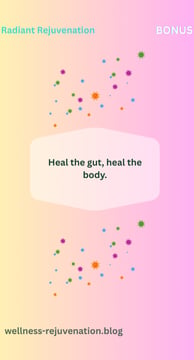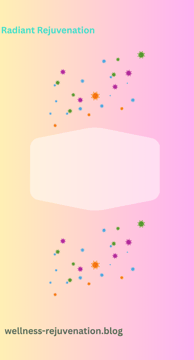Stress and Your Gut: How Anxiety Wreaks Havoc on Digestion (and What to Do About It)
Discover how chronic stress impacts your gut health, leading to bloating, IBS, and other digestive issues. Learn natural solutions like mindfulness, breathing exercises, and gut-friendly nutrition to restore balance.
By Pamela, Radiant Rejuvenation
12/2/20244 min read


Stress and Your Gut: How Anxiety Wreaks Havoc on Digestion (and What to Do About It)
Did you know your gut is often called your "second brain"? 🧠💭 It’s true! Your gut and brain are in constant communication, and when stress enters the picture, it can throw your entire digestive system out of whack. From bloating and discomfort to more serious issues like IBS, chronic stress can wreak havoc on your gut health. But don’t worry—there’s hope! In this post, we’ll explore the gut-brain connection, how stress impacts your digestion, and natural solutions to help you feel your best. Ready to take control of your gut health? Let’s dive in! 🌊
What is the Gut-Brain Connection?
Your gut and brain are linked through a complex network known as the gut-brain axis. This two-way communication system involves your nervous system, hormones, and even the trillions of bacteria living in your gut (your microbiome). 🦠✨
When you’re stressed, your brain releases cortisol, the "stress hormone." While cortisol is helpful in short bursts, chronic stress can lead to elevated levels, which disrupts your gut’s delicate balance. This can cause inflammation, alter your gut microbiome, and even lead to a condition called "leaky gut." 🚨
Understanding this connection is the first step to breaking the cycle of stress and digestive issues.
How Stress Affects Your Gut
Chronic stress doesn’t just mess with your mind—it takes a toll on your gut, too. Here’s how:
1. Fight or Flight Mode: When you’re stressed, your body goes into "fight or flight" mode, diverting resources away from digestion. This can slow down or disrupt the digestive process, leading to bloating, cramping, and discomfort. 😣
2. Cortisol Overload: High cortisol levels can damage the lining of your gut, causing inflammation and increasing the risk of leaky gut. This allows toxins to enter your bloodstream, triggering even more inflammation. 🔥
3. Gut Microbiome Imbalance: Stress can throw off the balance of good and bad bacteria in your gut, leading to issues like IBS, food sensitivities, and even mood disorders. 🦠⚖️
If you’ve ever felt "butterflies" in your stomach before a big presentation or experienced digestive issues during a stressful time, you’ve felt the gut-brain connection in action.
💫 Want wellness content made simple?
The Radiant Rejuvenation Gut Health Quote Pack gives you 30 beautifully designed quotes, a Canva template, and a guide to help you share your light.
🎁 Click here to download your pack
Is Stress Messing with Your Gut? Look for These Signs
How do you know if stress is affecting your gut? Here are some common signs to watch for:
- Bloating and Gas: Feeling puffy or gassy after meals? Stress could be the culprit. 🎈
- Irregular Bowel Movements: Constipation, diarrhea, or alternating between the two are classic signs of stress-related gut issues. 🚽
- Food Sensitivities: Suddenly reacting to foods you used to tolerate? Stress might be to blame. �
- Fatigue and Brain Fog: A stressed gut can lead to low energy and difficulty concentrating. 🥱
If these symptoms sound familiar, it’s time to take action.
How to Heal Your Gut and Manage Stress Naturally
The good news? You can break the stress-digestion cycle with simple, natural solutions. Here’s how:
1. Practice Mindfulness and Meditation 🧘♀️
Mindfulness is a powerful tool for reducing stress and calming your gut. Try spending 5-10 minutes each day meditating, journaling, or simply focusing on your breath. Studies show that mindfulness can lower cortisol levels and improve gut health.
2. Try Breathing Exercises 🌬️
Deep breathing activates your parasympathetic nervous system, which helps your body relax and digest. One simple technique is the 4-7-8 method:
- Inhale for 4 seconds.
- Hold for 7 seconds.
- Exhale for 8 seconds.
Repeat this cycle 3-4 times to feel calmer and more centered.
3. Eat Gut-Friendly Foods 🥦🍓
Your gut loves fiber-rich foods, probiotics, and anti-inflammatory ingredients. Add these to your diet:
- Probiotics: Yogurt, kefir, sauerkraut, and kimchi.
- Prebiotics: Garlic, onions, bananas, and asparagus.
- Anti-inflammatory foods: Turmeric, ginger, leafy greens, and fatty fish.
4. Make Lifestyle Changes 🛌🏃♀️
Small changes can make a big difference:
- Prioritize sleep (aim for 7-9 hours per night).
- Exercise regularly to reduce stress and support digestion.
- Stay hydrated to keep your digestive system running smoothly.
When Should You See a Doctor?
While these natural solutions can help, it’s important to consult a healthcare provider if your symptoms persist or worsen. They can help rule out other underlying conditions and provide personalized guidance.
In Conclusion
Your gut and mind are in constant conversation, and stress can often disturb that balance. But with mindful practices and gut-supportive tools, healing is within reach. Small shifts, shared wisdom, and a commitment to wellness can help you feel more grounded, vibrant, and at ease—starting today. 🌿
Take the Next Step: Empower Your Gut-Brain Connection
Understanding the intricate link between stress and digestion is the first step toward holistic wellness. To support your journey, I've curated the Radiant Rejuvenation Gut Health Quote Pack—
30 beautifully designed, ready-to-use quotes
A customizable Canva template
A mini guide to help you share your light
These resources are perfect for coaches, creators, and wellness enthusiasts aiming to inspire and educate their audience.








